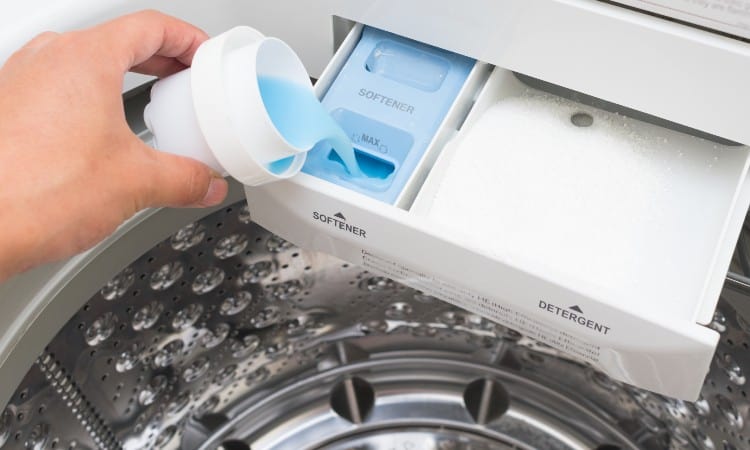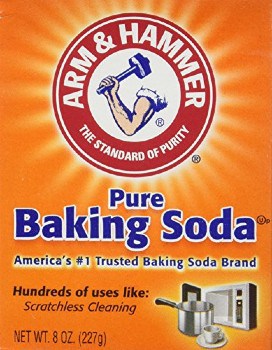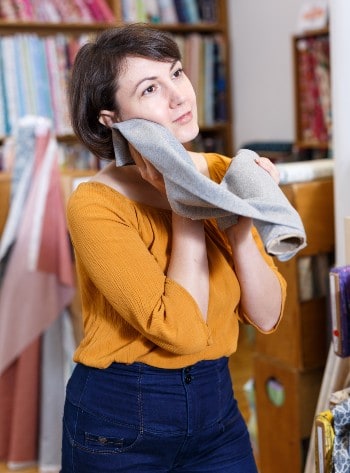New clothes (and even some older clothing) can sometimes feel stiff, scratchy, or itchy, making them downright uncomfortable. You and I both know that there’s nothing better than softer clothing. It tends to feel better against the skin and more comfortable. So is there a way to soften clothing that is stiff, itchy, scratchy, or just otherwise not soft?
Fabric softener is the most often used way to soften clothing since. But it can’t be used on all clothing because it contains chemicals that can work the opposite way on certain fabrics or cause damage to them. If you can’t use fabric softener, there are plenty of other ways to naturally soften fabric instead of fabric softener, such as vinegar, baking soda, Epsom salt, hair conditioner, and even dryer balls.
In this article, I’ll explain how to soften fabric using all of the methods mentioned above. I’ll also explain how to soften fabrics that are specifically stiff or scratchy and how to soften specific fabrics such as cotton and polyester.

Quick Navigation
Can You Make Clothes Softer?
Most fabrics can be softened through the use of chemical softening products, such as fabric softener, or more natural ones, such as vinegar and baking soda, among others.
Commercial fabric softeners work by coating the fibers to lubricate them, which causes less friction and static between them, thus making them softer. However, fabric softener does contain chemicals, dyes, and fragrances, which can cause damage to certain fabrics or affect their texture.
Other natural products work by taking some of the stiffness out of the fibers without wearing them down and damaging them. These are generally safe to use on most fabrics, especially those in which fabric softener can’t be used.
It’s also worth noting that the type of fabric you’re trying to soften will determine how quickly the fabric gets soft and how soft the fabric gets. For example, natural fabrics such as cotton, linen, and wool may soften more and may do so more quickly than synthetic fabrics such as polyester, acetate, etc. But with the right products and a little patience, you should be able to soften almost any type of fabric.
How to Soften Fabric: 8 Ways
Without further ado, let’s look at some of the best ways to soften fabric. Some of these methods may take longer to soften fabrics to your liking than others, and, in some cases, you may have to use more than one of them over time until you find out which one works best for you.
1. Fabric Softener

The easiest and most commonly used way to soften clothing is to use a commercial fabric softener. As the name implies, fabric softeners are designed and specially formulated to soften clothing, and as I mentioned, they work by coating the fibers. You just add some fabric softener to the dispenser in your washing machine and let the machine do the rest.
Fabric softeners come in all kinds of types and fragrances, and there are even free and clear versions that don’t contain as many harsh chemicals as their scented counterparts. However, even free and clear fabric softeners can’t be used on all types of clothing, so it’s important to know which fabrics you can generally use fabric softener.
For starters, fabric softener should not be used with any type of clothing that has a coating on it. That includes fabrics that are flame-repellent (such as sleepwear) and water-resistant. Since fabric softener works by coating the fibers, it can make the fabric less flame-repellent or water-resistant because it interferes with the coating that is already on the fabric.
Fabric softener shouldn’t be used with microfiber or towels because it can interfere with how well these materials absorb moisture or trap dust. It also shouldn’t be used with sportswear because it can interfere with the fabric’s moisture-wicking ability.
Lastly, it shouldn’t be used with fabrics such as wool, cashmere, fleece, or silk because it can interfere with the fabric’s warmth, texture, and other properties. If you’re ever in doubt about whether you can use fabric softener on a certain fabric, check the care tag and use one of the other methods below if fabric softener can’t be used.
2. Baking Soda
 An easy way to soften your clothes and freshen them up at the same time by reducing odors is to use baking soda. This is a great method to use with sportswear, towels, etc. It will soften the clothing without interfering with the fabric’s functionality.
An easy way to soften your clothes and freshen them up at the same time by reducing odors is to use baking soda. This is a great method to use with sportswear, towels, etc. It will soften the clothing without interfering with the fabric’s functionality.
To use baking soda to soften clothing, you’ll first want to let your washing machine fill up halfway with water before adding clothes. Then, add about ½ cup of baking soda to the water and let it dissolve; then, add your clothes and wash as normal. In a front load washing machine, you can add baking soda to your detergent dispenser. Do this with every wash for maximum softness and odor reduction.
3. Vinegar
 Another method you can use on any type of fabric is vinegar. Vinegar makes clothing and fabrics softer by removing excess soap and other residues from the clothing due to its acidic properties. Plus, it can also brighten up colored clothing.
Another method you can use on any type of fabric is vinegar. Vinegar makes clothing and fabrics softer by removing excess soap and other residues from the clothing due to its acidic properties. Plus, it can also brighten up colored clothing.
You’ll want to add ½ cup to the fabric softener dispenser instead of using fabric softener. The vinegar will be released during the rinse cycle when fabric softener is normally released. Alternatively, you can add the vinegar directly into the machine on top of the clothing, but you’ll want to do so right before the rinse cycle starts so that there’s no vinegar odor left behind on your clothing.
4. Baking Soda & Vinegar Together
For an even stronger fabric softener that can be used with any type of clothing, try mixing baking soda and vinegar. Not only will your clothes be softer, but they’ll also smell fresher, look brighter, and feel cleaner since you get the benefits of both vinegar and baking soda with this method.
To use them together, you’ll first want to mix 1 cup of baking soda and 7 cups of vinegar in a bowl. Stir them until they are well combined. Then, add a ⅓ cup to the fabric softener dispenser or the rinse cycle during washing and allow the mixture to work its magic. Store the rest in a jar for next time.
5. Epsom Salt
 Epsom salt is another easy and effective way to soften your clothing and other fabrics. Just add 1 tablespoon of Epsom salt directly to the wash, and as the salt dissolves, it will make your clothing softer. You can add the Epsom salt as-is or add a drop of essential oil to the salt before adding it to the wash to make your clothing softer and smell fresher.
Epsom salt is another easy and effective way to soften your clothing and other fabrics. Just add 1 tablespoon of Epsom salt directly to the wash, and as the salt dissolves, it will make your clothing softer. You can add the Epsom salt as-is or add a drop of essential oil to the salt before adding it to the wash to make your clothing softer and smell fresher.
You’ll want to be careful using too much essential oil in the Epsom salt. Don’t use more than one drop because essential oils can be a fire hazard when the clothing gets put in the dryer, especially if the oil doesn’t get rinsed out of the clothing well. If you use this method, it may be best to air-dry the clothing. (As long as you use Epsom salt by itself without adding essential oils, it should be safe to put the clothing in the dryer.)
6. Hair Conditioner & Vinegar
 Another great method for softening fabrics using products you likely already have at home is mixing hair conditioner and vinegar. Hair conditioner works by softening your hair, and it can also do the same for your clothes, particularly natural fabrics such as cotton and wool. You can use any type or scent of hair conditioner that you like.
Another great method for softening fabrics using products you likely already have at home is mixing hair conditioner and vinegar. Hair conditioner works by softening your hair, and it can also do the same for your clothes, particularly natural fabrics such as cotton and wool. You can use any type or scent of hair conditioner that you like.
In a large bowl, add 6 cups of water, 3 cups of vinegar, and 2 cups of hair conditioner. Stir the mixture gently until all ingredients appear to be evenly combined. Then, add about 1 cup of the mixture to the fabric softener dispenser or the rinse cycle as a gentler alternative to fabric softener. Store the rest of the mixture in a jar for future use.
7. Dryer Sheet
 Many people use dryer sheets in place of fabric softeners. They are used in the dryer instead of in the washing machine and help remove static from clothing, make it smell fresher, and soften your clothing. You can buy commercial dryer sheets or make your own at home.
Many people use dryer sheets in place of fabric softeners. They are used in the dryer instead of in the washing machine and help remove static from clothing, make it smell fresher, and soften your clothing. You can buy commercial dryer sheets or make your own at home.
An easy way to make your own dryer sheets at home is with squares of cotton fabric (or washcloths). Add the hair conditioner, vinegar, and water mixture you made earlier to a spray bottle. Then, spray it onto the cotton squares or washcloth and toss them into the dryer along with your clothes before drying. Using the mixture you made earlier to fragrance and soften the clothes is safer than using essential oils.
8. Dryer Balls
 Last but certainly not least, you can use dryer balls in the dryer to soften your clothes. The great thing about dryer balls is that you can use them in the dryer after using one of the other methods in the washing machine. Dryer balls work to soften clothes by getting bumped around in the dryer among your clothes.
Last but certainly not least, you can use dryer balls in the dryer to soften your clothes. The great thing about dryer balls is that you can use them in the dryer after using one of the other methods in the washing machine. Dryer balls work to soften clothes by getting bumped around in the dryer among your clothes.
Dryer balls can be made either from wool or dryer-safe plastic material. The plastic dryer balls usually have dull spikes on them, which help soften clothes, and wool dryer balls help soften clothes and reduce static.
With wool dryer balls, you can also spray the hair conditioner, vinegar, and water mixture on them to make your clothes even softer and smell fresh. Just toss them in the dryer along with your clothes. If you don’t have dryer balls, you can use tennis balls instead and spray them with the hair conditioner mixture.
How to Soften Stiff Fabric Quickly
Certain fabrics, such as polyester or other naturally stiffer fabrics, may take a while to soften, especially if you’re just relying on the methods above. With that being said, there is a way that you can soften these stiff fabrics temporarily if you want them to be softer much quicker.
The best way to soften stiff fabrics quickly is to first swirl them around in soapy water so that they can become dampened and clean, if necessary. Then, rinse the clothing to rinse out the soap. Then, fill a sink or tub with clean water and add a tablespoon of fabric softener to the water. Add your clothing to the water and let it soak for about 5-10 minutes before drying.
If you can’t use fabric softener with a particular fabric, you can follow the same process by adding ½ cup of vinegar, baking soda, or both to the water instead. Remember that this will provide temporary softness, but with repeated washing with one of the fabric softening methods above, the stiff fabric will become softer.
How Do You Soften Cotton Fabric?
Fabric softener is one type of fabric that you can use pretty much any fabric softening product to make it softer. You can use pretty much any of the methods above. Still, the best and quickest ways to soften cotton fabric are to use either a commercial fabric softener or vinegar along with a dryer sheet or dryer balls in the dryer.
Whichever method you use is up to your personal preferences. Some people prefer to use more natural methods than commercial fabric softeners and dryer sheets. You will want to use vinegar and either make your own dryer sheets or use dryer balls instead. With particularly old or delicate cotton fabrics, you’ll also want to use vinegar instead of fabric softener since vinegar doesn’t contain as many chemicals.
How to Make Polyester Softer
 Polyester is one of those fabrics that can naturally be a bit stiffer, so it can take a while to soften it. And being a synthetic fabric, polyester is also a type of fabric commonly coated to be flame-resistant, water-resistant, etc., so you want to be careful with using commercial fabric softeners.
Polyester is one of those fabrics that can naturally be a bit stiffer, so it can take a while to soften it. And being a synthetic fabric, polyester is also a type of fabric commonly coated to be flame-resistant, water-resistant, etc., so you want to be careful with using commercial fabric softeners.
If you know that the polyester fabric isn’t coated with anything, you certainly can use a commercial fabric softener to soften it. But if you aren’t sure, it’s better to steer clear of fabric softener and use vinegar or another method instead.
Vinegar will work best because it won’t affect any coatings that the polyester fabric may have. It will also soften polyester much quicker than many other methods above. However, it still may take a couple of washes before noticing any significant softness difference. Since commercial dryer sheets work similarly to commercial fabric softeners, except that they are used in the dryer, you may also choose to use dryer balls instead.
How to Soften Itchy and Scratchy Clothes Naturally
As with stiff clothes, clothes that are a bit scratchy may take longer to soften. Some fibers are naturally scratchier than others, such as wool, and fabric softener generally can’t be used with wool, so it will take longer for the scratchiness to wear off. With that being said, there are ways that you can soften the wool and other scratchy fabrics naturally.
With wool, the best way to soften it is to soak it in a solution of cold water and about ¼ cup of vinegar for a few hours. Then, rinse the clothing under cold water to remove the vinegar scent. Make sure to only use cold water with wool, as hot water can cause the fabric to shrink.
For scratchy clothing that isn’t as delicate as wool, you can still soak the clothing in vinegar or soak it in a solution of 1 part salt to 8 parts water for a few days, then rinse the clothing and wash it in the washing machine. If clothes are scratchy on the inside, turn the clothing inside out and run a pumice stone across the fabric, then soak them in vinegar for a few hours before washing.
You can use a pumice stone on the outside of the fabric to soften it as well (except with wool clothing). However, the pumice stone may distress graphics, so be sure to avoid them with the stone.
Conclusion
There are plenty of ways to soften clothing, even if fabric softener can’t be used for whatever reason. Vinegar, baking soda, Epsom salt, hair conditioner, and even dryer balls can all be used in various ways to soften clothing. If you found this article helpful, share it with others. Thanks for reading!